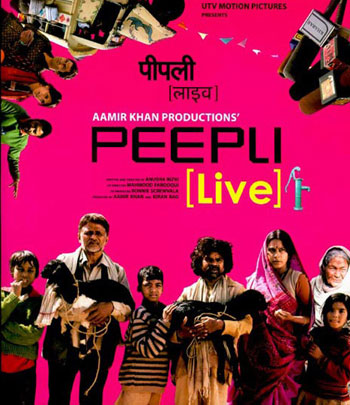Peepli Live – 3*
 ‘True India lies in its village’ was Gandhi’s infamous and wise quote. The heart of any country lies in its roots – both in the literal and actual sense, and not in the urban metropolis that springs up around them. This lively satire set in the small fictional village of Peepli is a credit to these epic words and unfolds to demonstrate the true sense of the saying ‘media circus’ in the time of election fever with comical but tragic circumstances.
‘True India lies in its village’ was Gandhi’s infamous and wise quote. The heart of any country lies in its roots – both in the literal and actual sense, and not in the urban metropolis that springs up around them. This lively satire set in the small fictional village of Peepli is a credit to these epic words and unfolds to demonstrate the true sense of the saying ‘media circus’ in the time of election fever with comical but tragic circumstances.
What starts as local idle chit chat about how best to save a family’s farm from auction turns into a national issue, twisted out of all recognition by spin doctors and their masters; the politicians and the media. The authorities use poor, ignorant farmer Natha’s (Omkar Das Manikpuri) threats of suicide to gain alleged government compensation and save his family’s legacy against their opponents, to the point where even Natha begins questioning whose mental state is on test here, increasing our sympathy for his plight. Government corruption is a common theme in film, but it is always the local cultural take on such farcical events that give Peepli Live its unique charm, vitality and colour, coupled with lively musical medleys.
The story begins at the slower pace of life expected of rural living, albeit a little too drawn out and languid to the point of disinterest at times. Thank goodness for the hilarious shrieking matches between the family’s women members – the age-old mother-in-law and daughter-in-law ‘slag off’ – who actually have the upper hand over their incompetent men folk at home, but who are deemed financially powerless in society’s and the caste system’s eyes. It is these wonderfully staged scenes that give the film its spirit and contemporary insight on cramped and basic living conditions. That said the issues the farming family faces ring true, globally, in all in these times of credit crunch.
Peepli Live also provides an intriguing character study of the different roles and social etiquette for women in Indian society, from rural housewife to ambitious TV correspondent. In fact the film is a series of juxtapositions, mainly past clashing with present. But it is the very real emotions and humanity that win through in every situation to unite all backgrounds.
The hypocritical political stench that is raked up is visually portrayed when the circus trundles out of town, leaving a trail of destruction in its path. This is the most poignant visual moment in the film with the debris of containers and bottles left for the perplexed villagers to clean up, whilst attempting to return to some form of normality – a tall feat, considering some have now been exposed to a more affluent and media-savy way of life.
In terms of audience appeal, this may be a foreign-language art-house picture and not to the average cinemagoer’s taste. However, with some clever box office promotion, it could reach a wider UK audience because of its lunacy, social messages and nostalgic sentiment of a simpler life from yonder years. Interestingly, its star Natha looks crestfallen in the end scene, possibly pining for just this – ironically, something he had. Peepli Live also provides a much-needed wake-up call to any rapidly developing region that happiness is never found in worshipping consumerism, fakery and even celebrity – the latter being something Bollywood counts on. But without the right push, Peepli Live is in danger of going the same way as its namesake village and becoming forgotten in film-making history.
3/5 stars
By L G-K